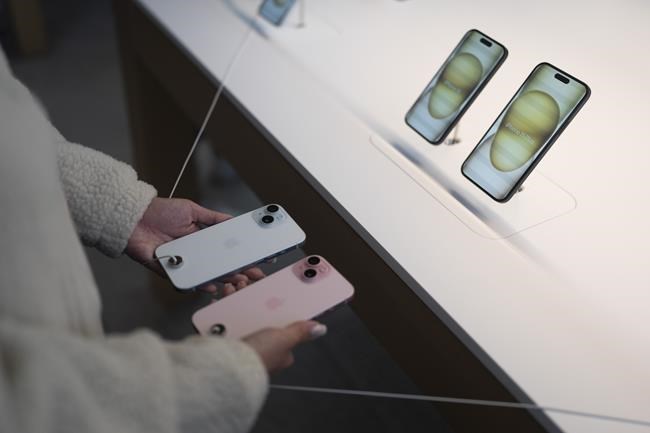VANCOUVER — A judge in British Columbia will decide next month whether to approve a multimillion-dollar settlement of a class-action lawsuit against Apple for allegedly slowing down older model iPhones with its software updates.
Lawyers for the company and class members in a lawsuit originally filed in 2018 were in a Vancouver courtroom Monday, urging approval of the settlement, where consumers would receive between $17.50 and $150, depending on the number of claims that are successful.
Michael Peerless, a lawyer for the class, told Justice Sharon Matthews that the amounts will be paid out to those who can prove ownership of affected phones that include several iPhone 6 and 7 models.
He said the settlement was "hard fought" after “lengthy and difficult negotiations" with the company, and said the amounts proposed to be paid out is “in the range that a consumer should hope for.”
Peerless told the judge that similar litigation in the United States provided a "valuable road map" during settlement negotiations, which could see Apple pay out a maximum of about $14.4 million to class members.
Similar lawsuits were filed in Ontario, Saskatchewan and Alberta. The settlement agreement would apply for residents in all provinces except Quebec.
The U.S. case in California saw the company settle with iPhone users whose devices were throttled by software updates, diminishing the phones' performance and battery life.
The California case settlement range was between $310 million and $500 million.
Peerless said the claims process will be very "simple," with an online and paper-based option for people to use if they bought devices that had slow performance and battery issues.
"It provides real, not massively large, but real monetary benefits. It's not a coupon settlement, this is cash and it offers reasonable recovery for what class members suffered," Peerless said.
It would've taken "multiple more years" to get paid out had the case gone to trial, he said, and there'd be no guarantee of success or a bigger payout had they gone that route.
"The damages in a case like this are difficult to quantify," Peerless said. "There's no real judicial guidance for something like this. We're never going to have a Supreme Court of Canada trilogy about what damages are for a slowed down smartphone.
"But what we were able to do is to negotiate the maximum amount achievable for a very large number of class members in this case," he said.
He said notice of the settlement was provided to about nine million class members by email, and 10,000 by physical mail, while also receiving "significant media coverage."
Jill Yates, a lawyer for Apple, told the court the company has never admitted wrongdoing.
"Apple, throughout, has taken a position that it has done nothing wrong here," she said. "These claims are novel and they are not ones where Apple agrees that anything was wrongfully done."
The judge has reserved her decision on approving the settlement until Feb. 21, 2024.
This report by The Canadian Press was first published Jan. 29, 2024.
Darryl Greer, The Canadian Press




